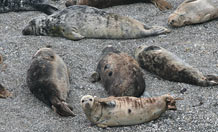Articles

Robbie McDonald has contributed to research on seals' diets. Photo by Professor Brendan Godley, University of Exeter.
Discoveries boost region's reputation for environmental research
New discoveries from the University of Exeter’s Environment and Sustainability Institute will boost the region’s reputation for world-class research.
Four new studies by academics at the Environment and Sustainability Institute (ESI) at the Cornwall Campus, Penryn, have now been published in leading journals and brought to the attention of scientists all over the world.
The studies highlight the range of expertise within the ESI, from the impact of past climate change on animals to how people today can benefit from contact with nature.
ESI Director Professor Kevin J Gaston has contributed to a study in leading journal Science, which explains the link between climate change since the last major Ice Age and where different amphibians, birds and mammals live today. The research highlights the risk of extinction when climate changes rapidly in particular areas and raises serious questions about how modern-day species will fare as our climate continues to change.
Professor Gaston has also worked with a team on a study that explores how people’s sense of wellbeing is linked to their understanding of the range of wildlife in their local area. The research calls for more of a focus on engaging people with green spaces in their towns and cities.
Professor Robbie McDonald, who joined the ESI full-time in January, has contributed to research that evaluated simple measures that could help reduce the potential for badgers to spread bovine tuberculosis. The research team tested the effectiveness of on-farm biosecurity measures to prevent badgers from entering farm buildings. They found that measures such as sheet metal gates or electric fencing were 100 per cent effective in preventing badgers from entering farm buildings and eliminated contact with cattle and cattle feed. They also reduced the number of visits from badgers to the rest of the farm.
Professor McDonald has also worked with a team to understand the diets of grey seals and common seals living in UK waters. They found surprising variation in the type of fish seals ate. The research shows that seal foraging is dependent on many different local and temporary factors, meaning that general assessments of their impact on fisheries is especially problematic. The research team hopes their study will help balance the needs of fisheries with the needs of seals.
Director of the Environment and Sustainability Institute, Professor Kevin Gaston said: “These four studies are the first from the Environment and Sustainability Institute. They give a small flavour of the range of our expertise and interests and of the high-quality research we will deliver. In addition to building our reputation within the scientific community, we are also engaging with businesses across the region. Working with businesses, we aim to find some practical solutions to the problems caused by environmental change and make a real difference to people’s lives.”
The ESI is an interdisciplinary centre leading cutting-edge research into solutions to problems of environmental change. In so doing it will enhance lives by improving people’s relationships with the environment.
Located at the Cornwall campuses, which the University of Exeter shares and jointly manages with University College Falmouth, the ESI has been enabled by investment from the European Regional Development Fund Convergence Programme (£22.9 million) and the South West Regional Development Agency (£6.6 million), as well as significant support from the Higher Education Funding Council for England (HEFCE).
The ESI will place Cornwall and the Isles of Scilly at the forefront of cutting-edge research into solutions to problems of environmental change. In so doing it is enhancing people's lives by improving their relationships with the environment.
The ESI has three research themes: clean technologies, natural environment, and social science and sustainability. It will engage with hundreds of businesses in Cornwall, the Isles of Scilly and beyond to translate its research and expertise across these themes into innovative business practice, products and services.
Date: 9 March 2012
